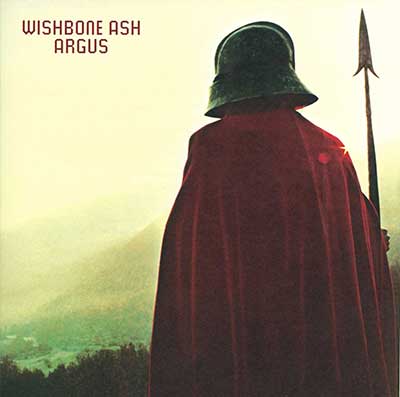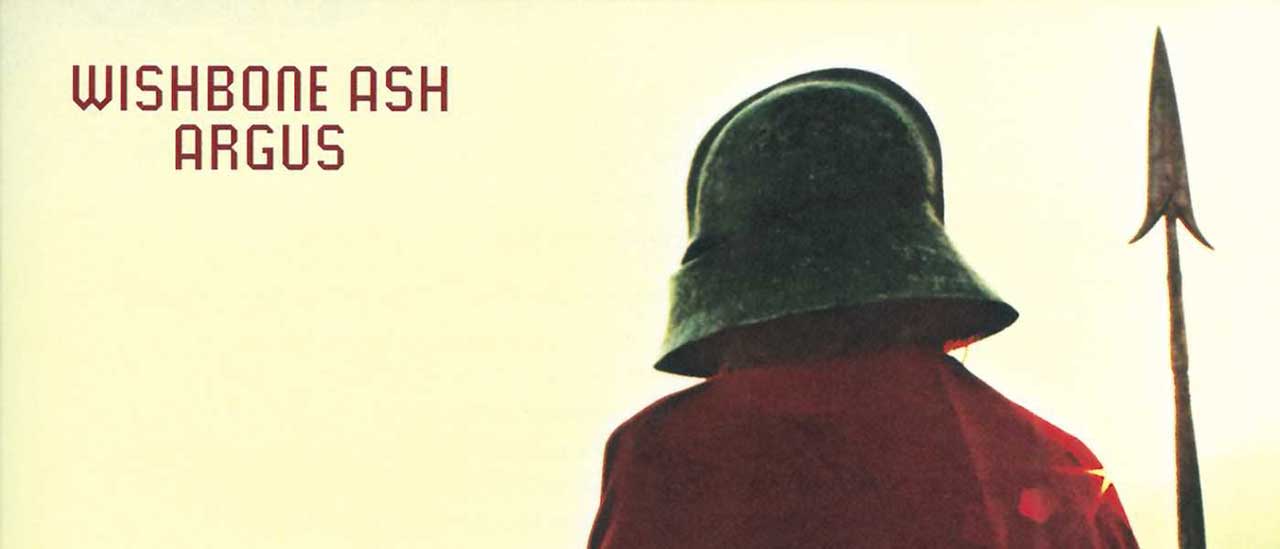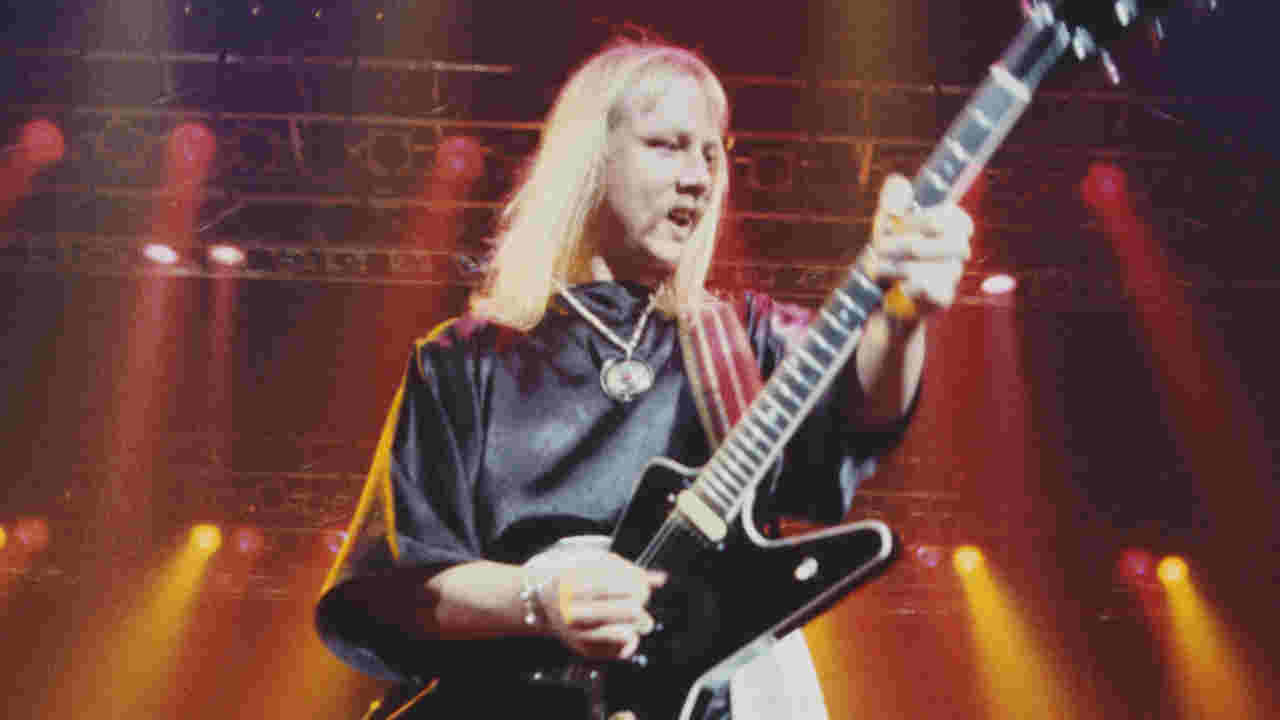You can trust Louder

Time Was
Sometime World
Blowin' Free
The King Will Come
Leaf and Stream
Warrior
Throw Down the Sword
It’s unusual for a group that’s been around for 50 years and released a huge catalogue of live and studio recordings to be defined – some might even say overshadowed – by one album in particular. But that’s very much the case with Wishbone Ash and Argus.
Released on April 28, 1972 Argus transformed Wishbone Ash into international stars – at the third time of trying. Pooled from the London-based combo’s disparate backgrounds in hard rock, folk and crisp, electric blues, its soothingly evocative strains introduced a pioneering twin-guitar approach that was adopted by countless other bands.
So extraordinary was Argus that its popularity became a bugbear for the band in the coming years.
Every week, Album of the Week Club listens to and discusses the album in question, votes on how good it is, and publishes our findings, with the aim of giving people reliable reviews and the wider rock community the chance to contribute.

Background
With their first two albums, Wishbone Ash adopted a democratic approach to making music. When it came to plotting out guitar solos, Andy Powell says that he and fellow guitarist Ted Turner decided “whoever felt they had the most important voice” for each particular song. But blessed with three singers in the band, everybody except drummer Steve Upton got an opportunity at the microphone. Sometimes they even doubled up, and in the unusual case of Blowin’ Free all three took turns.
“Deciding who sang what was sometimes a sticky one. Back then, Andy and Ted weren’t over-endowed with confidence or, for that matter, overly interested,” recollects bassist Martin Turner, a former choirboy who displayed no such reticence. “They were more set on being guitar players. But I leant on them because Ted’s voice had a lovely croon to it.”
Sign up below to get the latest from Classic Rock, plus exclusive special offers, direct to your inbox!
Though the others don’t recall things quite the same way, Martin contends that with Argus he felt the need to “become a little more forthright” and exert some authority. “If you’re the main guy that’s writing the stuff you’ve every right to say, ‘Shut up and listen to what I’m telling you – play that and nothing else and we’ll be home in time for dinner’, instead of entering into some mass debate,” the bassist says. “Everyone played their part in contributing and we were four very strong characters, but on this occasion I contributed more than most.”

Other albums released in January 1972
- Jamming with Edward! - The Rolling Stones, Nicky Hopkins, Ry Cooder
- Garcia - Jerry Garcia
- Cass Elliot - Cass Elliot
- Coven - Coven
- Hands of Jack the Ripper - Screaming Lord Sutch
- Hendrix in the West - Jimi Hendrix
- Into the Purple Valley - Ry Cooder
- Keep the Faith - Black Oak Arkansas
- Loose - Crazy Horse
- Rockpile - Dave Edmunds
- The Spotlight Kid - Captain Beefheart
- Weird Scenes Inside the Gold Mine - The Doors
- Blue Oyster Cult - Blue Oyster Cult

What they said...
"1972's Argus is the prime piece in the Wishbone Ash collection and a must have for any fan of 70s progressive rock. It shows pioneering twin lead guitar work, great (independent) basslines, a lot of melody, and a nice mystic feel in the music and lyrics, which is also expressed in the album cover. (SputnikMusic)
"I get the feeling from listening to this record that Wishbone Ash could have been much more. The talent was certainly there, and the tightness of the band was of the highest order. From my studies of the period, though, the 1970’s were a pretty weird time everywhere, so perhaps the bad energy floating around finally got to them. However, there’s no question that Argus deserves consideration when people talk about the better records of that era." (AltRockChick)
"The lyrics touched on medieval themes (The King Will Come, Warrior) always popular with British rock bands, adding a majestic tone to the music, but it was the arrangements, with their twin lead guitar parts and open spaces for jamming, that made the songs work so well." (AllMusic)

What you said...
Richard Cardenas: Fantastic record which fit my mood perfectly today. I love Blowin' Free and consider it one of my all time favourite songs. The rest of the record is a perfect balance between prog, hard rock and pop.
I saw them in 1976 and still remember where I sat, who I went with and those incredible twin guitars.
Joe Cogan: An absolute monster of an album. It was voted best British album of 1972, and it's hard to dispute that. Brilliant playing, and they caught lightning in a bottle as far as the songwriting is concerned. Everyone needs to hear this record as part of their bucket list: it really is that good.
Ranjit Roy: first discovering Wishbone Ash thru a compilation - Classic Ash. King Will Come, Blowin Free, Persephone, Rock n Roll Widow. What songs - just blew one's mind away! Then got hold of Argus - perhaps their finest work. Those were the days of cassettes and the song remained the same by playing and playing it over again over and over again - this feeling was called ashed out.
Kev Sullivan: As with almost all Ash, the album material is superb. But unlike many bands, the live versions always seem to take things to another level. Argus in particular and especially the first three tracks. To this day I find it hard to pick up a guitar and not run through the Time Was rhythm guitar sequence. The album is etched into the brain.
Andrew Bramah: A very eclectic mix of influences all mixed together to form an original sound. Very laid back assured playing. Great songs. Easily the best of the original line up.
Possibly lacks a little production "sparkle". Unique guitar sound for the time and vocals were never over done.
John Burton: I loved the first two albums at the time, so bought Argus sight unseen (sound unheard?) when it came out, and have loved it passionately ever since.
Considering that they were the originators of the twin lead guitar sound, it’s wryly amusing that the band should be Martin Turner’s (the bass player and majority song writer). Such a pity about the later court room wrangles between him and Andy Powell.
I play Argus regularly, the only thing wrong with it is that it is too short! Whilst writing this I have got Leaf And Stream going through my head. Truly a sublime track on the best album from 1972.
Tom Dee: The best album of their career by a mile. My go-to album from when it was released until now. Seen them play this four or five times and will be looking to see them with Andy Powell in Tewkesbury later in the year. Top class writing and performing. Pity Wishbone Four didn't live up to this one. They redeemed themselves with There's the Rub and Number The Brave. One of my top three albums of all time. Has to be 10/10.
Mike Knoop: Between having one of the best Hipgnosis album covers of all time and being namechecked by heroes like Judas Priest, Saxon, and Iron Maiden; I was very excited about Wishbone Ash before I ever heard a note. Hearing the proto-metal Queen Of Torture on a compilation CD only increased my excitement for their masterpiece, Argus. I was shocked to find it was so…mellow. And the singer was certainly no Rob Halford.
So I put it away for a few years, and in that time, came to appreciate a much wider swath of music, especially pretty, expansive or deliberately “fussy” rock music like Yes, King Crimson, CSN&Y, as well as folk music like Fairport Convention, John Fahey, and Bert Jansch.
Now I hear Argus with much more metaphorically well-rounded ears and enjoy it quite a bit. The guitar harmonies are great but so are the vocal harmonies that I didn’t pick up on before. I love the almost country rock feel of Time Was and the beautiful melancholy of Leaf And Stream and Sometime World. I can also now hear the direct line from Wishbone Ash’s Warrior to Thin Lizzy’s Emerald to pretty much anything off of the first four Maiden albums.
I’ve learned that if I don’t “get” a masterpiece the first time around, to give it some time and try again. This method has worked with Roxy Music and Pink Floyd. Someday I know I’ll finally grasp Van Morrison’s Astral Weeks.
Ed Feeley: Love this album and Wishbone's twin guitar sound, but just to clarify, The Allman Brothers were also doing a lot of stuff with guitar harmonies around the same time so they deserve some credit also. Having said that, this a terrific album with great tunes, great riffs and plenty of extended solos.
To me, the secret of Wishbone's lighter sound comes from their choice to not play full barre, or power chords all the time, but instead opt to use the lighter chord voicings of the higher strings. Even though every tune on here is played using electric guitars a lot of the tunes feel like they would work just as well using acoustic guitars. I'd also recommend their first album, Wishbone Ash and There's The Rub as examples of their best work.
Roland Bearne: Years ago I got a Wishbone Ash best-of. Unfortunately, with all the rock and metal bombast booming around in my brain, their tasteful twanglings got a bit lost and it disappeared into CD collection with only occasional sightings reported.
My ears have matured somewhat and from the first play this week, Argus has been a total delight. I'm definitely going to find this on vinyl. The beautiful pallet of intertwining clean, mellifluous melodies and rhythms caress the ears delightfully. The lines to Maiden and Lizzy are there to hear but in Sometime World I also hear bass playing that surely made a major impact on Geddy Lee as he honed his chops (this may be common knowledge and I'm just showing my ignorance!).
Quite splendid from end to end. Ash fans who have been bending my ears for years... I get it. A keeper.
John Davidson: Argus is one of those genuine classic albums that was already regarded as a relic from another era by the late 1970s.
Back in 1977 I had a cassette tape recording of Argus that I took on holiday and remember playing it to death on a little mono portable tape player - there were no frills like headphones before the Walkman!
The laid-back style, the slightly mythic /Arthurian themes and the mix of guitar and vocal harmonies were the antithesis of Punk and the NWOBHM that followed.
But none of that matters now.
It still has all the class and charm it did back in the day. It's not glossy but its not grubby either. The production is pretty straightforward I guess, but suits the music .
Time Was and Sometime World both start slow before kicking into a higher gear half way through. But the fact that Blowin' Free is the out and out 'rocker on the album tells you all you need to know about how musical tastes had evolved within the next few years
One of the aspects i really like about the album is the bass playing - which given Martin Turner wrote most of the songs is perhaps unsurprising.
My only real criticism is that it sounds a bit measured and precise. I saw Wishbone Ash play most of this album live last year or the year before and they breathed real life into the songs. It must have been even better in their heyday.
Overall, it was great to listen to this again, even if it is a bit dated. None the less the strong songwriting and musicianship shine through. 8/10.
Hai Kixmiller: I never heard of this band until now. The album is bookended by a couple of songs that kinda gave off a Pink Floyd and/or The Who vibe. I definitely thought that Pete Townshend could've written some of these melancholy songs. I really enjoyed the songs in the middle of the record. They sorta gave off a Crosby, Stills, Nash, and Young vibe especially some of the vocal melodies and harmonies. There was also a hint of some southern blues rock that had me looking up some old Ozark Mountain Daredevil , Black Oak Arkansas, and Marshall Tucker Band stuff.
This was surprisingly a very entertaining rock album. No barn burners or fist pumpers here, still, some nice mellow jams to just sit back, chill, and grove to.
Bill Griffin: I had to delete my initial review because I have it in my car now and have a completely different opinion than I did listening to it on my lower quality pc speakers.
While I still haven't heard anything that reaches out and grabs me, I like it a lot more than I did. I do have a problem with the vocals by committee approach though. The voices just don't mesh like say, Crosby, Stills and Nash do. Not unpleasant but not inspiring either.
This album does shine instrumentally but I don't hear the twin leads I was expecting anywhere. Comparisons to the twin guitars of Thin Lizzy, made often, are way off base to my ear. Having someone play rhythm while someone else plays a lead is not what I consider a twin guitar attack. Still, the instrumental breaks are pretty good. Having Martin Birch behind the board helped a lot I'm sure, and my new found appreciation is a relief. One week after saying I had never heard an album Birch was involved with that I didn't like, this one was close.

Final Score: 8.86 ⁄10 (333 votes cast, with a total score of 2952)
Join the Album Of The Week Club on Facebook to join in. The history of rock, one album at a time.
Classic Rock is the online home of the world's best rock'n'roll magazine. We bring you breaking news, exclusive interviews and behind-the-scenes features, as well as unrivalled access to the biggest names in rock music; from Led Zeppelin to Deep Purple, Guns N’ Roses to the Rolling Stones, AC/DC to the Sex Pistols, and everything in between. Our expert writers bring you the very best on established and emerging bands plus everything you need to know about the mightiest new music releases.


